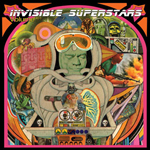
Various Artists
Invisible Superstars Vol. 001 Comp
(The Secret Life of Sound; 2007)
By Craig Eley | 18 August 2007
Henry Jacobs’ 1950s audio collages, anything by Lee ‘Scratch’ Perry, Double Dee and Steinski’s “Lesson” series, John Oswald’s “Plunderphonics,” the Beastie Boys’ Paul’s Boutique (1989), Girl Talk’s Night Ripper (2006), and everything in-between: it’s a quick history of copyright violators, producers, collage artists, field recorders, and other musicians that we might now say do “mash-up” or “beat production” or “found sound” or “sound art.” It struck me that this type of music—which isn’t one type, I know, but we might generalize under the technique of “sampling”—falls into two (and surprisingly only two) categories: hip-hop and sound art. On one hand we’ve got Just Blaze, making new magic out of old grooves, and on the other hand we’ve got Jacob Smigel, collecting old tapes into soundtracks of other people’s lives. On one hand club bangers, on the other hand think pieces.
I’m generalizing here, but some of my favorite listening experiences come from albums that foreground the superficiality of such distinction. This has actually been the status quo in recent years, where the collective We has focused on hip-hop as a kind of “art” (an idea that isn’t without it’s own problems, but whatever). From Deltron 3030: The Instrumentals (2000) to Entroducing… (1996) to J Dilla’s Donuts (2000) the hip-hop producer as compositional genius is something that many hip-hop heads and casual listeners bring to the fore.
That’s why it’s so great to hear more and more interesting things happening in this post-Night Ripper world [“Cough.”—Ed.], where hip-hop producers can still be underground copyright renengades and “sound artists” can make records that sound more and more like hip-hop. Recent offering’s on the Illegal Art label like Oh Astro’s Champions of Wonder and Realistic’s Perpetual Memory Loss underscore this point, as does a compilation by Chicago-based The Secret Life of Sound Records. The comp, Invisible Superstars 001, dropped in November in a limited vinyl pressing or digital download. It’s filled with funky guitar jams, atmospheric trips, found sound samples, analog synths, and a slew of other materials pasted together into a hip-hop dreamscape by some of the underground’s most innovative producers. In a word: it’s hott. In more words: it’s a refreshing trans-genre instrumental album that’s perfect for the underground hip-hop connoisseur as well as field recording (and other types of) nerds.
Take “Romoxy,” a track from Bay Area producer Corsic, a self-proclaimed broke dude selling a CD-R on his Myspace. It’s all soul-infused piano and a jazzy shuffling beat, with a touch of synth that all work to set the scene in a near-future speakeasy. Then, out of nowhere, near the four minute-mark, an electric guitar cuts through the smoke like so many lasers in an arena rock show, charging the song for it’s final act. Sure, it will all return to where it started, that guitar a short memory that someone might have doodled on a cocktail napkin.
“Consumer” is more straightforward, with a thumping bass line and funky guitar sample swirling around with rimshots and cymbals and giving off another dark-ass future scenario, albeit with the warmth of very traditional instrumentation. I mean “funky” here, like the genre: this track is straight funk. Controller 7, the man at work here, is another Bay Area resident and Anticon favorite. He’s the one responsible for this assemblage, and as such we have him to thanks for tracks like Miles Tilmann’s “Chicken Salad Beats,” which is as silly as the name implies, a totally electronic affair with broken toy piano introduction, panning whistles, dirty synth lead, and someone laughing manically. I don’t know what was in the chicken salad, but it’s tripping Miles Tilmann the fuck out.
Not all of the tracks are instrumental, and Scott Matelic’s “Thoughtless” samples a woman singing over a rhythmic piano line that sounds a lot like CRS’ “Us Placers” from Kanye’s last mix tape. It might suffer from too much saxophone, which is a complaint that could be leveled against the comp as a whole. For all of the potential here, and all of the genre bending promised, we do end up with one relatively mundane sci-fi effects and movie sample track (Buddy Place’s “Slow Gang Funeral), and a heavy reliance on samples stolen from jazz combos. Thomas Dimuzio’s “Car Crash” bucks that trend with a minimal composition that is almost entirely void of rhythm. It’s an interesting piece filled with crickets, radio static, and digital noise.
The thing about songs like this is that you want to imagine your favorite rapper just spitting fire over the beat, Weezy or Pusha T or Doseone or Will Smith or whatever you’re into. You also might want to cue it up, chop it up, and rearrange it in your own little way—hell, rap over it yourself. This is how we do: remixes of mash-ups, dub versions of a capella tracks, recording your goddamn cat. The Secret Life of Sound Label, who says flat out on their site that “they do not believe in styles any more,” made pretty good on that claim with this collection. Go ahead and do the same. Or just buy it and play it for your friends at your next chilled out party, while still believing firmly in styles, while acting like you don’t. It’s easier to talk about music that way. You know, at parties.





